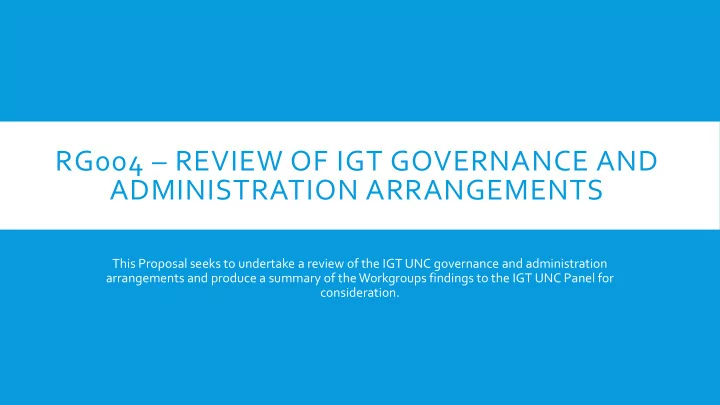

RG004 – REVIEW OF IGT GOVERNANCE AND ADMINISTRATION ARRANGEMENTS This Proposal seeks to undertake a review of the IGT UNC governance and administration arrangements and produce a summary of the Workgroups findings to the IGT UNC Panel for consideration.
RFI RESULTS SUMMARY OF FINDINGS The RFI was issued to industry on 18th July 2018 to seek Industries views on the proposed problem statements and proposed solutions. It also sought to find out their company’s preference in moving forward and requested any opinions on areas the review group may have missed. Generally, Industry indicated that whilst the total amalgamation of both the IGT UNC and UNC was, in practice, a good idea, there was either not sufficient evidence at present to suggest that the IGT UNC governance was in imminent need for change or that there was currently too much other change (e.g. Retail Energy code, Faster Switching) in the industry and it was not a priority at this time. There was however support for some suggested solutions which would help the efficient running of the Code. The Panel have approved two further workgroup sessions to explore and develop these options.
NEW SOLUTIONS Option 2 -To create a common UNC and IGT UNC modification process so that when a modification is raised under the UNC it considers the IGT UNC and requires any changes to the IGT UNC legal text to be produced simultaneously; Option 5 - Allowing the Code Administrator to raise non-material modification proposals on behalf of industry in order to cut down on duplicated resource, and reduction in the frequency of modification workstream meetings; and Newly proposed Option 7 - Set up a Cross Code working Group to look to improve the current modification process across both the IGT UNC and the UNC.
OPTION 2 TO CREATE A COMMON UNC AND IGT UNC MODIFICATION PROCESS Under this proposal, the two Code structures would be retained; however, a mechanism would be put in place to ensure that any changes to the UNC take into account required consequential changes to the IGT UNC (and possibly vice versa). Option A – A new type of modification proposal is raised by either party to the IGT UNC or UNC. This would then be viewed by both the IGT UNC Panel and UNC Panel and, if accepted, MUST be referred to a Joint Workgroup meeting for discussion. The modification process is identical to those now in both Codes, and a joint Workgroup report would be produced, presented to the respective Panels, and again if accepted, a DMR sent out for a joint consultation (both IGT UNC & UNC legal text should be available at this stage). (N.B Both Panels will be able to determine that at any time up to the point where the recommendation on the FMR is made, that the joint modification process should discontinue. At this point individual Code modifications could then be progressed under single governance if desired). An FMR would be produced and the UNC Panel would vote on the implementation, consistent with the current UNC voting process. Agreement to implement (either by the UNC Panel or by the Authority) will be a direction to change both the UNC legal text and the IGT UNC legal text – e.g. both Code Administrators will make the required changes to their respective legal texts via a Code release which will be aligned.
OPTION 2 TO CREATE A COMMON UNC AND IGT UNC MODIFICATION PROCESS Option B – Separate modifications are raised at the same time and follow a similar modification process via joint workgroups to develop modifications and legal text concurrently. Voting rights will remain separate and implementation aligned. The driver for this Option could be that UNC and IGT UNC impacts would be discussed at the same time and in the same (joint) workgroup thus eliminating the need for separate IGT UNC workstream discussion. The Workgroup is asked to: Define advantages and possible limitations to this option. Define the possible road blocks for the implementation of this option Discuss the UNC view on this option. Set some initial business rules for this option.
OPTION 5 ALLOWING THE CODE ADMINISTRATOR TO RAISE NON-MATERIAL MODIFICATION PROPOSALS This proposal would address the proposer’s concerns that current IGT work is administrative and duplicates resource. This option may also encourage better engagement in the Workgroup meetings, as holding less frequent meetings would mean that agendas would be fuller. This would not limit the Code Administrator from holding ad-hoc Workgroup meetings if there was an urgent modification in the process. Any modification proposals raised would have to meet Fast Track Self- Governance requirements. IGT UNC Panel would still have control over the modification process and would have the final decision in progressing modifications.
OPTION 5 ALLOWING THE CODE ADMINISTRATOR TO RAISE NON-MATERIAL MODIFICATION PROPOSALS Gemserv analysis on Code Administrator (CA) involvement in the modification process: BSC - Proposer led changes. Although CA can raise changes to ancillary documents. Critical friend is carried out to Code changes. MRA - MIFs are raised by industry parties, critical friend performed throughout. Discussed at IREG & Change proposals (CP) created by CA alongside the proposer. CP then entered into the change process. SPAA - Proposer led changes. Critical friend is carried out to Code changes. UNC - Proposer led changes. Critical friend is carried out to Code changes. SEC - Proposer led changes. Critical friend is carried out to Code changes.
OPTION 7 SET UP A CROSS CODE WORKING GROUP The Workgroup is asked to: Define Terms of Reference and Scope of the group. Suggest a frequency of meetings. Define composition of the group e.g. CA or Industry parties. Set some initial business rules for this option.
NEXT STEPS The Workgroup is asked to: Consider what conclusions can be drawn for the Workgroup report Suggest which options are most viable for potential progression by the industry Conclude which options address the initial problem statements
Recommend
More recommend